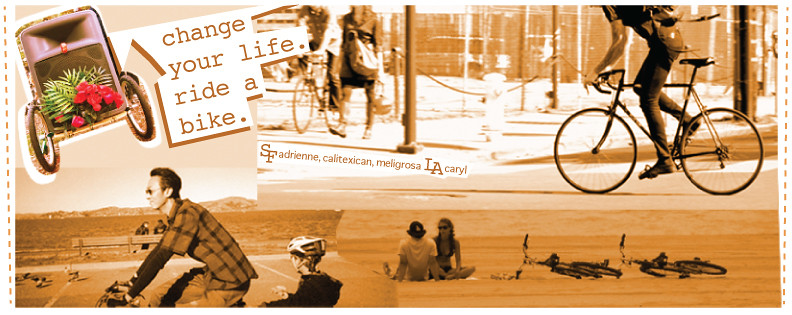We are all aware of the less than optimally well behaved bicyclist. Most know them by the term, a term I loath, "the Scofflaw". We see them, or perhaps you see me, failing to stop at every sign or riding on a sidewalk or taking the wrong way on a one way street... and we instantly assume that that rider thinks they are "entitled", another word I loath for its inappropriate overuse. For the most part, very few of us out here in the world look at those riders and think "if this street were better designed there would be no need to run that light/ride on that sidewalk/go the wrong way..."
Just as all of us feel stressed out, harried and late the second we hit the freeway in our cars, we also feel vulnerable, threatened and squeezed when we take to the poor excuse for public space we call the streets and roads of the United States on our bicycles. While there are many people out there who feel that the law is in place to keep us "safe", it is my opinion that, for the most part, the law is there to prevent us from behaving in our own best interests in environments that have developed in a way that prevents us from acting normally. So much of what we see is the result of adapted behavior to sub-optimal environments that all of us, regardless of transportation choice, are forced to survive in.
These thoughts came to me as I listened to the talk David Byrne gave at the 2010 TED conference on the influence of architecture on the development of music over the centuries. His feeling is the music developed as a result of the environment it was created in as opposed to humans first adapting the environment to our musical needs. As I listened it made me think of all the things in life that we do that are a result of our adaptation to the already built environment of the cities we live in. An example of this would be a city like San Francisco that has such a strong history of small, fully contained neighborhoods where you could walk to everything you needed- if the hills around you make it very difficult to walk or ride a horse/bike then you will make sure that your neighborhood has a market and a cobbler and a seamstress and a school... because it is just too hard to keep schlepping over the hill for every little thing. Our modern times have tried to superimpose a suburban, car based drive-through model on San Francisco since the 1950's and by just about every measure this has been a failure which we now all live with and have adapted to- up to, and including, the sub-optimal behavior of many bicyclists.
If Gregorian chanting came about in part due to the echoing nature of sound in grand cathedrals, then it isn't a stretch to say that people do seemingly odd things on bicycles because they can not pretend to be 40MPH delivery trucks racing to get across town. If we want those who ride bicycles to "behave" better than we have to give them an environment that encourages that behavior by making it easier and more convenient and a great deal safer to do so. Just as the Gregorian chant loses something when performed in an open air amphitheater, the urban cyclist loses something when they are forced to "share the road" with 30 ton buses and cab drivers who only know that time is money.
If I have not lost you to this point, perhaps you would like to hear the thoughts of Mr. Byrne yourself. Perhaps you will find some parallels of your own.
Subscribe to:
Post Comments (Atom)






Very, very well put. Thanks for the thoughtful reflection on cyclists behavior. I recently found myself rambling about a similar issue, specifically having to do with stop signs.
ReplyDeleteAnd you may also be excited to hear about ODOT trying to get bicycle signals officially included in Oregon traffic code. I'm hoping the effort succeeds because a few bike lights would go a long way to encouraging better behavior among cyclists, and improving their behavior as well as the behavior of cars.
Very well put. I would also like to make the point that everyone in this society is a traffic scofflaw. No one obeys traffic laws to the letter — certainly not motorists!
ReplyDeleteOf course, everyone knows that motorists rarely obey speed limits. Where drivers are not impeded by poor traffic conditions, they routinely drive 5 to 10 mph over the speed limit. This is normal! In fact, if you ever try to religiously obey the speed limit while driving, you will find other motorists honking at you to pick up the pace
But my least favorite scofflaw behavior from motorists involves their turning habits. For example: the law allows motorists to turn right on red in California, but it requires a full stop. Stand on any corner and see for yourself how motorists treat those right turns on red. They roll right through — often while looking over their left shoulder to check for oncoming car traffic, while failing to look to their right to spot pedestrians or cyclists.
So, if everyone disobeys the law, does any of it matter? I would argue that it does. We should insist that people obey the law especially where scofflaw behavior leads to accidents, injuries and death. That means that motorists simply must begin obeying the law in a rigorous, respectful manner — for the safety and wellbeing of all of us!
Since bicycle scofflaws kill no one and cause at worst injury only to themselves, it seems to me that our focus on their illegal habits is misplaced.
Will- wouldn't those signals be wonderful? i can think of many places I would put them in SF.
ReplyDeleteHugh- I wish we could stop speaking only in terms of which type of transportation causes the most death (I think most people get defensive when they are told a daily part of their lives is lethal). We need better infrastructure for all people so that we can all live better lives, not just to keep us from killing less.
And yes, when I drive the speed limit I get honked at constantly. Way more than when I am just riding around on my bicycle.
Thoughtful, thought-provoking post! Thank you Adrienne.
ReplyDelete